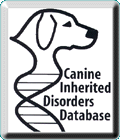
Lymphedema
Lymph is a clear watery fluid that is collected from tissues throughout the body and returned to the blood by way of the lymphatic vessels, as part of normal circulation. In lymphedema there is abnormal lymph flow, so that lymph fluids accumulate and cause swelling in the affected tissue.
Primary or inherited lymphedema is caused by abnormal development of the lymph vessels or nodes and has been reported in the breeds listed below. Secondary lymphedema can occur in any breed if there is obstruction of lymph vessels due to tumours, inflammation, surgery, etc.
In some breeds, the mode of inheritance has been shown to be autosomal dominant with variable expressivity.
The hind legs are most commonly affected, although front legs, abdomen, tail and ears can be affected too. The skin looks normal but has a thickened spongy feel, and if you press it, your fingers will leave dents.
Skin that is swollen due to lymphedema is susceptible to bacterial infection and delayed healing after injury, but otherwise your dog will be generally healthy.
Diagnosis is made based on physical examination and tests to rule out other causes of edema.
Mild cases of lymphedema may come and go, or persist without any adverse consequences for your dog's health. Soft compressive bandages may be required to reduce the swelling due to fluid (lymph) build-up, and antibiotics will be required in the case of infection.
Primary lymphedema is most commonly seen in puppies or young dogs as pitting, non-painful edema in the pelvic limbs. Pain usually indicates secondary infection.
Rule out other causes of obstructive, inflammatory, and hypoproteinemic edema.
Affected animals and their close relatives should not be bred.
FOR MORE INFORMATION ABOUT THIS DISORDER, PLEASE SEE YOUR VETERINARIAN.
Bonagura J. Lymphedema. In: Côté E, ed. Clinical Veterinary Advisor Dogs and Cats. Missouri: Mosby Elsevier, 2007:648-650.
- Disorder Type:

